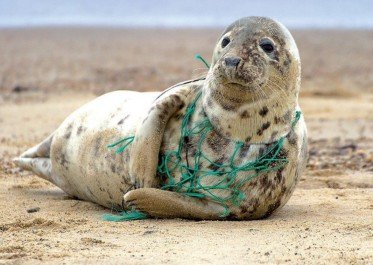UNIT 7
Correct recycling is important for many different reasons, one of which is the prevention of biodiversity loss. When synthetic materials land into nature, they do not only take ages to decompose, but can also harm animals, birds, fish and other living beings.
Here are some facts describing how plastic waste impacts the marine environment:
1. Pathogenic vector
Floating plastics can carry life-threatening bacteria and transport pharmaceuticals into coastal areas.
2. Raft for non-indigenous species
Plastic debris can transport non-indigenous species to new locations where they could become invasive.
3. Smothering
Plastic litter can smother marine life, preventing oxygen and nutrient flow and blocking light, dramatically reducing the numbers of organisms and compromising the ecosystem services they provide.
4. Damage to coral reefs
Marine litter deprives reefs of oxygen and light, causes physical damage and increases risks of coral diseases.
5. Harmful toxic effects
Plastics can contain many chemicals, some of which are hazardous. Chemicals are added during production (e.g., additives) and leach out rapidly upon arrival in the marine environment. Some will accumulate as a result of sorbing, while plastics reside in the water.
6. Ecosystem disruption by microplastics
Microplastics can disrupt biological processes in marine organisms and may cause genetic mutations, decreases in reproduction, disruptions in feeding, decreased growth and decreased survival.
7. Ingestion of marine litter
Ingestion of plastic can cause physiological stress, toxicological and starvation in plankton, shellfish, fish, seabirds, turtles, and marine mammals.
8. Effect on the benthic environment
Micro plastics affect species living in bottom environments, such as lugworms, that function as a source of food for wader birds and fish and bait for fisheries.
9. Entanglement of animals
Entanglement of birds, fish, turtles and mammals in abandoned fishing gear and plastic packaging can result in reduced fitness and impaired mobility, leading to starvation and drowning.
Your Task
1. On the eve of a national holiday when many people would go for a picnic on a beach / shore, make a post on your preferred platform reminding your followers of mindful and careful waste treatment and its importance, and attach a powerful image to it, e.g. Source:

2. Organize an activity (through your preferred social network) that includes going to the nearest beach/shore/forest/park and picking up all the garbage you find there (and recycling it accordingly afterwards). Be careful about personal protection though! You can also start a challenge and find out who collects more waste.
3. Check out if the nearby recreation area has the necessary containers for different types of waste as well as the (numerous) noticeable signs informing the visitors about that. If not, contact the responsible service and inform them / ask to settle the issue.
